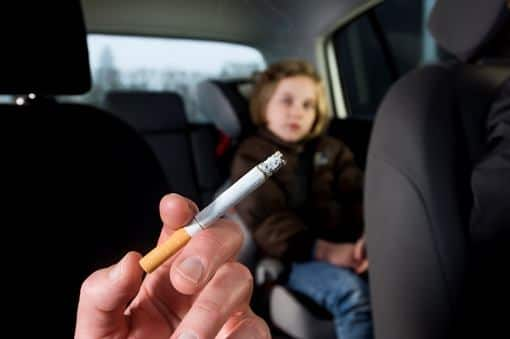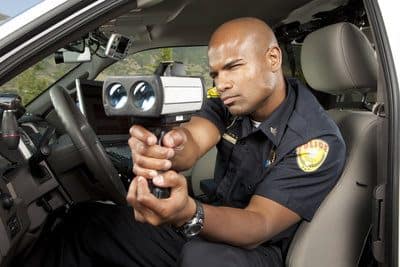Poor judgment won’t always get you in trouble, but that doesn’t mean it’s not criminal. There are some bad choices that are surprisingly legal, Insure.com found. Laws differ by state, but here’s a list of questionable activities that generally won’t result in you paying an expensive fine, standing in a courtroom or being hauled off to jail.
Keep in mind that even if your state doesn’t have a law against these actions, there may be some listed here that are banned by a local ordinance or municipal code. And, no matter what the law may be, we say stick with the golden rule of being nice to others and don’t do something foolish just because you can get away with it.

No shoes, no problem, if you’re driving. No law in the U.S., or Canada, has requirements on what you can or can’t wear on your feet while driving a car. Riding a motorcycle is a different story, if you’re in Alabama. This state requires anyone operating or riding on a motorcycle to wear shoes.
Even though it’s not illegal, it isn’t recommended. Driving barefoot could compromise your control of your vehicle. It’s common for local motor vehicle departments to issue bulletins noting that driving in bare feet, socks or stockings is dangerous because your feet can slip off the gas or brake pedals.
While lack of footwear on its own won’t get you a ticket, if police find it somehow contributed to an accident, you could end up with a citation for negligent or reckless driving.Such a ticket typically comes with a hefty fine and points on your license. Also, reckless driving is considered a major offense by many car insurance companies and could, therefore, cause your rates to rise.

What would happen if you let loose a profanity-laden rant at the officer who just pulled you over? You likely just increased the probability of getting a ticket for the original offense, but due to the First Amendment, you typically won’t face jail time, even if your state has a law against profanity.
A handful of states have laws banning swearing, though most of these statutes are very old in origin. For instance, Mississippi has a profanity law dating back to 1848 that says if any person uses vulgar and indecent language in the presence of two or more people, he or she can be fined up to $100 or placed in jail for up to 30 days.
But even if your state has outdated laws on the books regarding profanity, your First Amendment rights protect your free speech — even when the vulgar language is directed at an officer. A few years back, a North Carolina judge found its state’s profanity statute (from 1913) an unconstitutional violation of freedom of speech. Lawmakers there have since been trying to repeal it.
Word of warning: You could be ticketed in most states for disorderly conduct if you incite violence with your swearing. If you use abusive, indecent, profane or vulgar language in a public place and incite a “breach of peace,” you can be cited for a misdemeanor in some states, such as Texas.
But if you can prove its part of your First Amendments rights, you may still get out of the ticket.In June 2015 the Washington State Supreme Court ruled against an obstruction of justice case involving vulgar language. The case involved a 17-year-old who directed a slew of profanities at police officers and was cited for obstruction. The court noted that the “words may have been disrespectful, discourteous and annoying, but they are nonetheless constitutionally protected.”

Do you obey stop signs on private property, for instance, in parking lots? For safety reasons we say you should, but you may not be legally bound to, depending on which state you live in.
In many states, stop signs, and other “traffic control devices,” are only enforceable when a vehicle is being driven on a street or highway. Other states, however, extend such laws to private property that is open to the public, such as store parking lots and shopping malls.
In some other states, property owners are allowed to ask police to enforce traffic laws on their private road or in their parking lot. If that is the case, then you may be able to roll through a stop sign in one parking lot, but not the one across the street, where a store owner has an agreement with the local police – which you won’t know about until you’re ticketed.
All states have certain traffic offenses for which police can cite drivers on public or private property. The list varies but typically includes:
- Parking in a handicap spot
- Parking in a fire lane
- Drunk driving
- Reckless driving
- Careless or negligent driving
- Traffic signs that exit onto a public road
If you’re in an accident in a parking lot because you ignored a stop sign, it will be taken into account when the insurance companies determine which driver is at fault, regardless of whether it is a citable offense or not. If you’re the one found at fault, your liability insurance would pay for damages you caused others — and your car insurance rates would likely rise.

It seems obvious that leaving an infant or toddler unsupervised in car is a bad idea. Yet, Noheatstroke.org reports that there have been 39 heatstroke deaths of children in 2016, up from 24 in 2015. The Department of Meteorology & Climate Science at San Jose State University found that of the approximately 700 child vehicular heatstroke deaths since 1998, nearly 20 percent of the caregivers of these children left the child in the car intentionally.
Even if a child doesn’t get heat stroke, an unattended child may set the car in motion, get hurt by playing with power windows, strangled by the seatbelt or even taken by a stranger.
With scary outcomes like this, you’d think there would be a nationwide law against leaving your child in a car, but there is not. Only 19 states make it illegal to leave a small child unattended in a vehicle.
Of the states with laws, the age of the child that cannot be left unattended varies, as does the amount of time the child can be left alone. For instance, in Texas a child younger than seven can be left unattended in a vehicle for up to five minutes. But Florida’s law kicks in when a child younger than six is left alone for over 15 minutes.
Some legislators are working to prevent deaths from caregivers accidentally leaving children in the car unattended (an estimated 54 percent of kids dying from heatstroke are forgotten). U.S. Rep. Tim Ryan has sponsored legislation that would require the Secretary of Transportation to issue a rule requiring all new passenger motor vehicles to be equipped with a child safety alert system. This bill has been dubbed the “Hot Cars Act of 2016” and aims to get technology in cars that will warn the driver if a child is left in the back seat.

Similar to cursing at a cop, it’s not smart to make offensive gestures at law officers – and it’s a terrible tactic for getting out of a ticket. However, it’s not going to get you tossed in a jail cell. Your First Amendment rights come to your rescue.
The ACLU, which in 2011 provided criminal defense services for a driver in Denver who flipped off a police offer, told the Denver Post, “The protection of the Constitution is not limited to speech that is acceptable in polite society. The First Amendment also protects expression that may be disrespectful, coarse or even vulgar. It’s rude to flip off a cop, but it’s not a crime.”
The harassment charge against the driver was dropped, and the Colorado State Patrol described the incident as “protected free speech.”
In 2013, the U.S. Court of Appeals ruled that giving the middle finger to a police officer is not a reason to be arrested. The 14-page opinion, in part, stated that the “ancient gesture of insult” is not a valid reason for a traffic stop or suspicion of impending criminal activity. The case in question stems back to 2006 when a passenger in a car flipped off a cop who was using a radar device at an intersection in St. Johnsville, New York.The car was pulled over, and the passenger cited for disorderly conduct.
The legal ramifications of flipping off another driver, or cop, is a subject that some have researched quite thoroughly.For instance, Ira P. Robbins, a professor of law and justice at American University, has a research paper on the use of the middle finger and the First Amendment titled “Digitus Impudicus: The Middle Finger and the Law.” It cites several examples of law enforcement officers being given the middle finger and in all but one of the cases, the conviction was overturned on appeal because the First Amendment protects the “rights of middle finger users.”

Only 16 states allow people to light up in restaurants, but smoking in your car with kids as passengers is still permitted in 42 states. Studies of secondhand smoke exposure show that one person smoking in a car can make the air inside the vehicle up to 10 times more toxic than the level the EPA says is hazardous for breathing. The EPA also points out that children exposed to high doses of secondhand smoke are more likely to experience health issues, such as asthma, bronchitis and pneumonia.
Since the United States doesn’t have a federal law about smoking in vehicles that contain minors, individual states can set their own. Only eight states currently say no to smokers lighting up with a child in the vehicle:
- Arkansas (with children under 14)
- California (with children under 18)
- Louisiana (with children under 13)
- Maine (with children under 16)
- Oregon (with children under age 18)
- Utah (with children under 15)
- Vermont (with children 8 or younger)
- Virginia (with children 8 or younger)
The penalty and what can’t be smoked varies. In Oregon, the infraction is a secondary offense with a maximum fine of $250, and the law also covers marijuana and regulated narcotic. Virginia is the latest to join the list with their July 2016 law that says a fine of $100 can be levied against anyone in a car who holds a lit pipe, cigar, cigarette or other smoking equipment (secondary offense).
Numerous cities and counties in other states also have local smoking prohibitions in place if you’re transporting minors. In some areas, such as Kingman, Arizona, the law extends the ban to e-cigarettes.
In other states, such laws have failed to pass. Recently Florida, New Jersey and Ohio legislators tried to pass bills banning smoking in cars with minors, but none made it into law.

It’s legal to use a radar detector in all states except Virginia and also the District of Columbia.
An exception is the use of radar detectors on military bases in every state. Military installations say it’s a no-no and the gate guard will tell you to put it away, even if the state that the base is in permits a radar detector to be used.
Also, commercial drivers are held to different standards than private drivers. Federal law prohibits commercial vehicles from using radar detectors, so don’t try to outsmart the cops with a radar detector if you’re driving a commercial vehicle — or else you’ll be met with a hefty fine.
And, while you may not receive a ticket for having a radar detector, in several states if you mount the detector on your windshield, it may be against the law as an obstruction of the driver’s view and could result in a ticket.

Your car’s interior is hotter than outside air — a lot hotter. Leaving a pet in the car is a very bad idea, but not illegal in over half of the U.S.
The Humane Society of the United States describes how when it’s 72 degrees outside, the inside of your vehicle can heat up to 116 degrees within an hour. If it’s 80 degrees outside, your vehicle’s interior can reach 99 degrees within just 10 minutes. Rolling windows down has been shown to have little effect on the car’s interior temperature.
Allowing a pet to get too cold can also cause harm. The ASPCA notes that cars can act as refrigerators and hold in the cold and cause animals to freeze to death. Hypothermia can become a risk at 50 degrees. Massachusetts law is the newest state to enact a law (effective Nov. 2016) protecting animals left in cars. Its law allows officers to cite an owner when conditions in a car are threatening the health of an animal due to extreme heat or cold.
Only the following states specifically prohibit leaving an animal in a confined vehicle:
- Arizona
- California
- Delaware
- Illinois
- Maine
- Maryland
- Massachusetts
- Minnesota
- Nevada
- New Hampshire
- New Jersey
- New York
- North Carolina
- North Dakota
- Rhode Island
- South Dakota
- Vermont
- Washington
- West Virginia
In a handful of states, (Florida, Ohio, Tennessee, Virginia and Wisconsin) the law doesn’t hand out an explicit penalty for leaving a pet in a car, but it does allow police officers and others, such as an animal control officer, to use reasonable steps to rescue the animal. These rescuers also have immunity from civil liability, which means, for instance, they can’t be held responsible for damage to the car.
Penalties for leaving pets in cars vary significantly among states. For example, in Maryland the fine is $70, while in Rhode Island you may receive a fine of up to $1,000 or jail time of up to a year, or both.

It’s just rude to swoop in and steal someone’s parking spot, especially when the other party has been patiently waiting for the parked car to pull out and leave the space. A viral video posted this year showed how one driver responded to this situation. The driver used his Jeep’s winch to tow the car that stole his spot out of the space and back into the parking lot lane.
Maybe we need an Anti-Social Behavior (ASB) Act like the UK has to cover such petty offenses. The ASB basically says if you’re being a nuisance or annoyance in a residential setting or causing harassment, alarm or distress elsewhere, you can face a penalty. The Act allows for community remedies for bad behavior. Watching the parking spot stealer spending a day picking up trash from the parking lot could put a smile on your face.

While some bad moves have serious consequences, others are just downright silly, even if the point is to make a philosophical statement about religion.
You certainly won’t be thrown in the slammer for wearing a spaghetti strainer on your head, but you may not be allowed to get a driver’s license. It will hinge on your state and its stance on the Church of the Flying Spaghetti Monster and its members, who are known as Pastafarians.Some find the church to be a spoof, but its members say it’s not.
Many states’ DMVs turn down such requests, but in November 2015 the Registry of Motor Vehicles in Massachusetts allowed a woman to wear a colander on her head for her license photo. An attorney associated with the American Humanist Association helped her fight the right to wear her headpiece in her photo after first being denied since the RMV bans hats unless it is for medical or religious purposes.Her stance was that the right to wear religious headgear should extend to those who follow the Church of the Flying Spaghetti Monster as much as any other religion.
Someone who didn’t make the approved list is a 21-year-old college student in Chicago. In the summer of 2016, she persuaded DMV employees to take her driver’s license photo, but then received a letter from the Illinois secretary of state’s office saying her license would be canceled unless she had a new picture taken.Here the state has gone through this issue before and has the official stance that the metal headgear is satirical and not religious. A senior legal advisor for the state said that wearing the headgear was a form of free speech, but so is giving the finger, which also isn’t allowed for a driver’s license photo.




